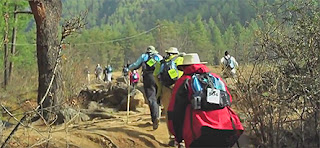The biggest movie of the year is Jurassic World. It is the story of thousands of
tourists flocking to a once exotic and isolated island to catch a glimpse of
creatures long-dead … and shop and dine in luxury. The lesson is, if you build it, they will come.
Which brings us to Anthropologist Pegi Vail, who is currently
the Associate Director at NYU’s Center for Media, Culture and History. Her
academic research focuses on “the political economy of tourism in the
developing world” and she has a book on the way from Duke University Press
titled “Right of Passage.”
She has also delivered the documentary Gringo Trails, which
worked the festival circuit throughout 2014, had a small arthouse theatrical
break and now heads to DVD — courtesy of Icarus Films — on Nov. 17.
For the record, the ARR for Gringo Trails is 438 days
and the limited run box office tally was $7,538 (arthouse exposure to generated
media interest and reviews).
Vail has gone to various once-exotic locations — from Mali
to Bolivia; Thailand to Bhutan — and demonstrates how backpacking adventurers
(way off the beaten path) leads to ever-growing numbers of backpackers (driven
by social media) and how the locals begin to adapt to their needs (food, drink,
lodging, supplies, etc.) and soon hoards of tourists follow. Everything changes.
 An isolated beach in Thailand transforms into a New Year’s
Eve party beach with over 50,000 drunken revelers. There’s always a need for more — even with
the fictional Jurassic Park and the need for ever-bigger dinosaurs to keep the
tourists flocking in. You can almost
hear Joni Michell’s Big Yellow Taxi
refrain, “They paved paradise and put up a parking lot,” in documentary filmmaker
Pegi Vail’s insightful work.
An isolated beach in Thailand transforms into a New Year’s
Eve party beach with over 50,000 drunken revelers. There’s always a need for more — even with
the fictional Jurassic Park and the need for ever-bigger dinosaurs to keep the
tourists flocking in. You can almost
hear Joni Michell’s Big Yellow Taxi
refrain, “They paved paradise and put up a parking lot,” in documentary filmmaker
Pegi Vail’s insightful work.
Bonus features include deleted scenes and extended interview
sessions with experienced travel writers.


No comments:
Post a Comment